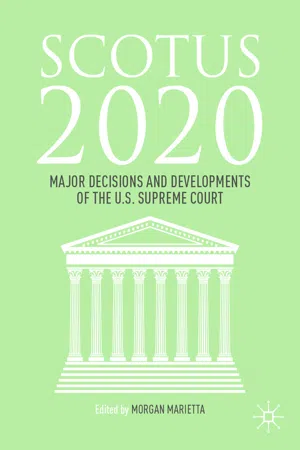- 1.Expand the prohibition of employment discrimination “on the basis of sex” under the Civil Rights Act of 1964 to include LGBT employees,
- 2.Allow states to ban “faithless electors” by requiring presidential electors to abide by their state’s popular vote,
- 3.Overturn the Trump administration’s rescission of the Obama administration’s DACA program on the grounds that the Administrative Procedure Act (APA) requires a full disclosure and discussion of the relevant facts including the reliance interests of the DACA recipients who would be affected,
- 4.Overturn state limitations on the participation of religious schools in public benefit programs; uphold exemptions for religious organizations with objections to the Obamacare contraception mandate; and affirm the autonomy of religious schools to select teachers under the “ministerial exception” to employment regulations,
- 5.Disallow noncitizens from bringing suits for damages in federal courts as a remedy for excessive force by US agents when the event occurred beyond US borders,
- 6.Overturn Louisiana’s abortion regulations requiring practitioners to hold admitting privileges at a local hospital, upholding the precedent from Whole Woman’s Health in 2016,
- 7.Allow individual states to limit the boundaries of the insanity defense grounded in competing perceptions of mental illness,
- 8.Limit convictions for fraud under federal law to demonstrable cases of self-enrichment, but not diversion of funds for political purposes as in the Bridgegate controversy,
- 9.Recognize that the Creek Indian reservation in Eastern Oklahoma—established by treaties in the 1800s—has never been disestablished by Congress, meaning that tribal sovereignty continues within Creek Nation boundaries and that major crimes must be tried in federal rather than state court,
- 10.Dismiss a claim of a constitutional violation when the local government has withdrawn the disputed regulation (making the original claim moot, in this case regarding gun regulation under the Second Amendment),
- 11.Disallow nonunanimous juries for criminal convictions under the Sixth Amendment,
- 12.Strike down the congressional limitation of the President to remove the head of a federal agency such as the Consumer Finance Protection Bureau as a violation of the separation of powers between the executive and legislative branches of the federal government,
- 13.Allow the President to resist congressional subpoenas that do not have a clear connection to ongoing legislation, and reject the claim of absolute immunity of the President from subpoenas from local prosecutors investigating a possible criminal charge.
Ch. | Case | Issue | Vote | Majority & Author |
|---|---|---|---|---|
2 | Bostock | LGBT discrimination (statutory interpretation of Title VII) | 6-3 | 4 liberals +Gorsuch, Roberts (Gorsuch) |
3 | Chiafalo | The Electoral College (federalism) | 9-0 | unanimous (Kagan) |
4 | DHS v. U. of Cal. | Executive power (statutory interpretation, reliance interests) | 5-4 | 4 liberals +Roberts (Roberts) |
5 | Espinoza | Religious liberty (Free Exercise v. Establishment) | 5-4 | 5 conservatives (Roberts) |
Lady of Guadalupe | Religious liberty (Free Exercise v. employment regulation) | 7-2 | 5 conservatives +Breyer, Kagan (Alito) | |
Little Sisters of the Poor | Religious liberty (statutory interpretation of ACA, APA, RFRA) | 7-2 | 5 conservatives +Breyer, Kagan (Thomas) | |
6 | Hernández | Noncitizen rights (restitution for constitutional violations) | 5-4 | 5 conservatives (Alito) |
7 | June Medical | Abortion regulation (precedent, federalism) | 5-4 | 4 liberals +Roberts (Breyer) |
8 | Kahler | Insanity defense (social facts, federalism) | 6-3 | 5 conservatives +Kagan (Kagan) |
9 | Kelly | Public fraud (statutory interpretation) | 9-0 | Unanimous (Kagan) |
10 | McGirt | Native rights (statutory interpretation) | 5-4 | 4 liberals +Gorsuch (Gorsuch) |
11 | NY Rifle & Pistol | 2nd Amendment (mootness) | 6-3 | 4 liberals +Kavanaugh, Roberts (unsigned) |
12 | Ramos | Nonunanimous juries (precedent) | 6-3 | 3 conservatives +3 liberals (Gorsuch) |
13 | Seila Law | Presidential power (separation of powers) | 5-4 | 5 conservatives (Roberts) |
14 | Trump v. Mazars | Presidential power re: Congress (separation of powers) | 7-2 | 4 liberals +3 conservatives (Roberts) (Alito, Thomas dissent to the right) |
Trump v. Vance | Presidential power re: state prosecutors (separation of powers) | 7-2 | 4 liberals +Gorsuch, Kavanaugh, Roberts (Roberts) |
